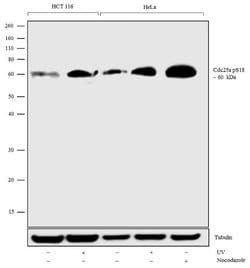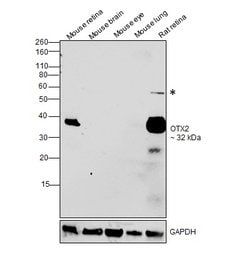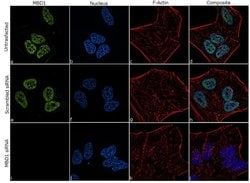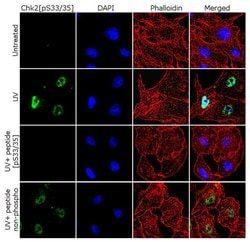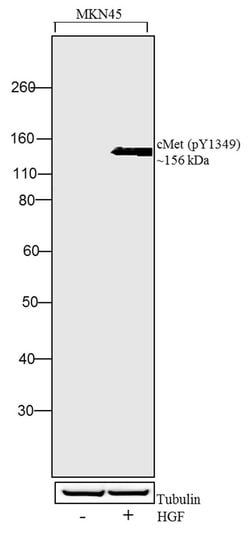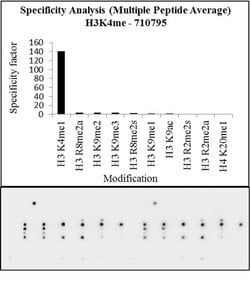Phospho-CHK2 (Ser33, Ser35) Recombinant Polyclonal Antibody (2HCLC), Invitrogen™
Manufacturer: Thermo Scientific
Select a Size
| Pack Size | SKU | Availability | Price |
|---|---|---|---|
| Each of 1 | 71-075-3-Each-of-1 | In Stock | ₹ 53,489.00 |
71-075-3 - Each of 1
In Stock
Quantity
1
Base Price: ₹ 53,489.00
GST (18%): ₹ 9,628.02
Total Price: ₹ 63,117.02
Antigen
Phospho-CHK2 (Ser33, Ser35)
Classification
Recombinant Polyclonal
Concentration
0.5 mg/mL
Formulation
PBS with 0.09% sodium azide; pH 7.2
Gene Accession No.
O96017
Gene Symbols
Chek2
Immunogen
Peptide corresponding to Human CHEK2 (aa 30-38)
Quantity
100 μg
Primary or Secondary
Primary
Target Species
Human
Product Type
Antibody
Isotype
IgG
Applications
Immunocytochemistry, Western Blot
Clone
2HCLC
Conjugate
Unconjugated
Gene
Chek2
Gene Alias
CDS1; cds1 homolog; Checkpoint kinase 2; Checkpoint like protein CHK2; checkpoint-like protein CHK2; Chek2; Chk2; Chk2 (phospho T68); Chk2 (pThr68); CHK2 checkpoint homolog; CHK2 checkpoint homolog (S. pombe); Chk2 phospho; Chk2 phospho T68; del9; EC 2.7.11.1; hCds1; HuCds 1; HuCds1; kinase Chk2; LFS2; OTTHUMP00000199044; OTTHUMP00000199045; OTTHUMP00000199064; OTTHUMP00000199115; OTTHUMP00000199116; phospho Chk2 (T68); phospho Thr68 Chk2; PP1425; protein kinase Chk2; Rad53; Rad53 homolog; RP11-436C9.1; Serine/threonine protein kinase Chk2; serine/threonine-protein kinase Chk2
Host Species
Rabbit
Purification Method
Protein A
Regulatory Status
RUO
Gene ID (Entrez)
11200
Content And Storage
Store at 4°C short term. For long term storage, store at -20°C, avoiding freeze/thaw cycles.
Form
Liquid
Description
- This antibody is predicted to react with Monkey, Pig and Rabbit
- Recombinant rabbit polyclonal antibodies are unique offerings from Thermo Fisher Scientific
- They are comprised of a selection of multiple different recombinant monoclonal antibodies, providing the best of both worlds - the sensitivity of polyclonal antibodies with the specificity of monoclonal antibodies - all delivered with the consistency only found in a recombinant antibody
- While functionally the same as a polyclonal antibody - recognizing multiple epitope sites on the target and producing higher detection sensitivity for low abundance targets - a recombinant rabbit polyclonal antibody has a known mixture of light and heavy chains
- The exact population can be produced in every lot, circumventing the biological variability typically associated with polyclonal antibody production
- CHEK2 (CHK2) is a serine/threonine kinase and a component of the DNA damage checkpoint pathway
- A mutation in CHK2 has been linked to cancer
- CHK2 is activated by DNA damage and phosphorylates several modulators of cell cycle control including tumor suppressor proteins
- In addition, Chk2 can phosphorylate BRCA1, allowing BRCA1 to restore survival after DNA damage
- Chk2 is a putative tumor suppressor protein, with mutations in to the Chk2 gene linked to Li-Fraumeni syndrome, a familiar cancer usually associated with inherited mutations in TP53
- Also, mutations in CHK2 are thought to confer a predisposition to sarcomas, breast cancer, and brain tumors.
